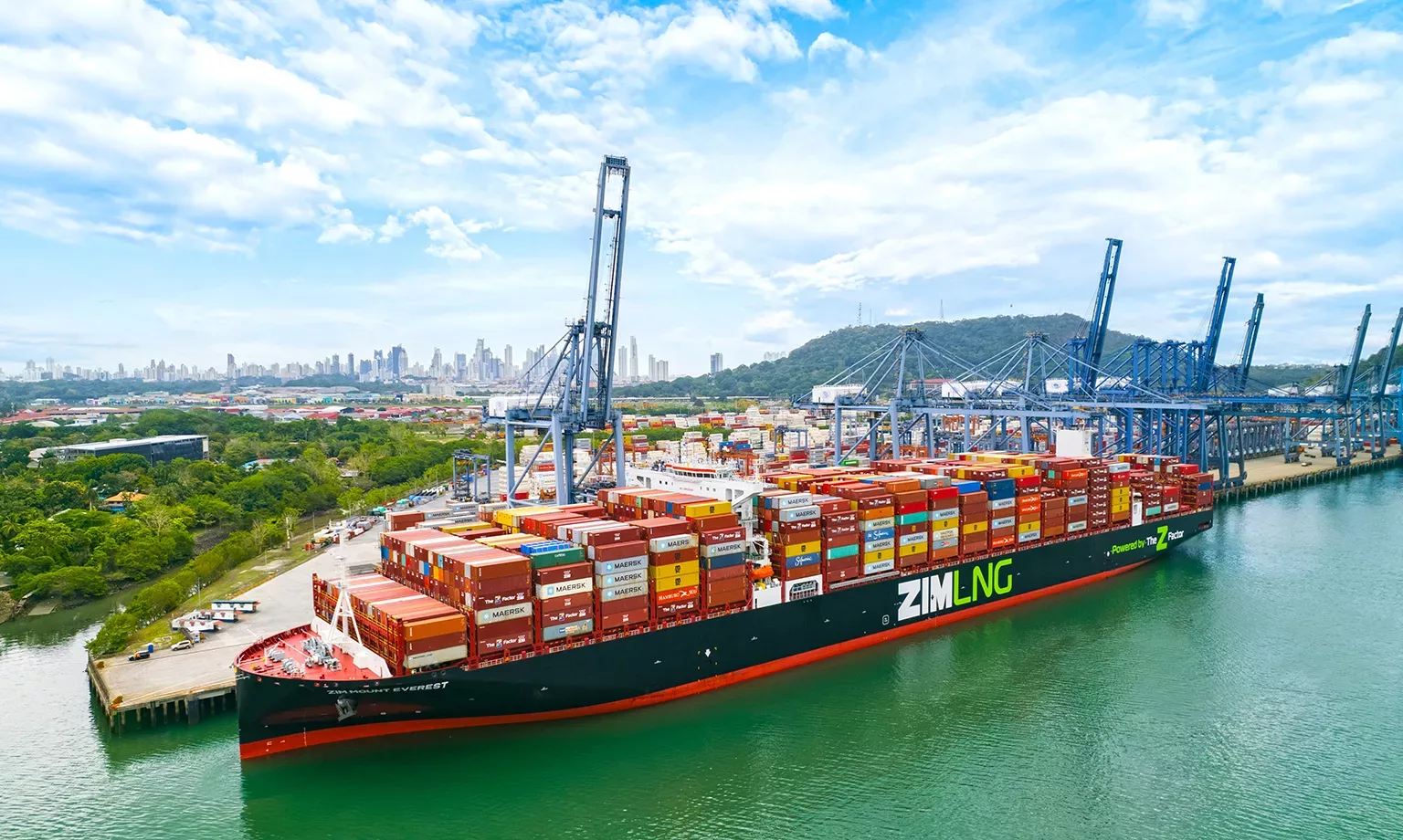We speak to the CEO of Hutchison Ports PPC, Jared Zerbe, who tells us how the company is steering the future of Panama’s cargo trade while implementing its green initiatives.
Hutchison Ports PPC (PPC) manages and operates the ports of Balboa and Cristobal, located on the Pacific and Atlantic sides of the Panama Canal, respectively. The company started operations in 1997, through an extendable concession of 25 years, plus 25 years granted by the government of Panama.
PPC is the largest port investor in Panama, generating a workforce of 5,000 direct jobs and around 25,000 indirect, and is a member of Hutchison Ports, the port and related services division of CK Hutchison Holdings Limited.
Moreover, Hutchison Ports is the world’s leading port investor, developer, and operator with an operations network of 54 ports, spanning 25 countries throughout Asia, the Middle East, Africa, Europe, the Americas, and Australasia.
“The ports, with their world-class facilities, are connected by a railroad and serve as a one-stop shop operation for transshipment and logistic services in Latin America and the Caribbean, both for inbound and outbound trade,” introduces Jared Zerbe, CEO of PPC.
The interterminal railway connecting the ports of Balboa and Cristobal has become the fastest way to link both terminals and reduce the distance between the two oceans. Furthermore, the ports are equipped with comprehensive facilities for handling containers, general cargo, bulk cargo, Ro-Ro, and passenger vessels.
Balboa’s location makes the port Latin America’s number one transshipping terminal, with an annual capacity of five million 20-foot equivalent units (TEU). The port has intermodal services, five berth positions for Panamax, Post Panamax, and Super Post Panamax vessels, a 1,710-meter dock, and 25 quay cranes.
The port at Cristobal allows for connection with the most crucial shipping routes in the Caribbean and the Atlantic Ocean with a two million TEU annual capacity. Its unique design, 13 quay cranes, three berth positions, and a 970-meter dock means managing a wide variety of services, including general cargo, reefer containers, non-containerized cargo, and warehouse.
PPC PLANS AND PROJECTS
Working toward digitalization and implementing a new approach, PPC’s new business model is focused on how it can better help support customers with operational planning, a level of innovation that will eventually reach the rest of the industry.
Currently, upon the arrival of a vessel ship, PPC unloads, loads, and handles the movement of containers. However, with the new approach, the shipping line will complete its end-to-end planning together with PPC.
“We are one of the leading ports in this respect, working with our customers to do joint planning, and there are only one or two other ports globally looking at this business model. Although we are currently operating manually, the goal over the next five years is to be fully automatic and digitalized,” reveals Zerbe.
Presently, PPC is also evaluating the development of three additional warehouses inside the port of Balboa to reduce time and cost. Ultimately, it will offer the client more options and added value within their logistics chain in a transshipment center where the cargo has already passed without receiving added advantages and benefits.
“We plan to expand both terminals to handle the increased container volumes we have forecast in the coming years. Therefore, in terms of infrastructure, the size of the ships will consistently grow, and the facilities to service them will need to as well,” he observes.
In addition to the expansion, PPC has been developing other non-containerized projects, such as new cruise facilities in its Atlantic terminal and more Ro-Ro transshipment regional business. The company has also modernized one of its warehouses inside the Balboa port and is using this as a pilot project to develop significant warehouses and distribution and logistics facilities.
SUPPLY CHAIN CHALLENGES
In recent years, global supply chains have not been without their challenges; the COVID-19 pandemic, political unrest in various parts of the world, including the Russo-Ukraine war, the climate change crisis, and geopolitics, have all caused disruptions in maritime transport and logistics, including port congestions with cargo shipments forcing some ports to close.
“Significant delays in the cargo supply chains have led to many routes being reconfigured and reinvented, which has elevated shipping costs as well as the goods that are transported,” Zerbe outlines.
However, as supply chain disruption is lessening, freight rates have begun to decrease, and the performance of ports has started to improve. Panama offers high logistics and port competitiveness, one of the most important being its strategic geographical position, which allows the connection of cargo from different destinations and routes around the world, thus shortening distances and operating costs.
PPC hopes to be recognized as a good corporate citizen, and its sustainability commitments will reinforce the company’s vision, to be the preferred partner for a sustainable supply chain.
“It is our duty as the world’s leading port network and Panama’s leading port operator to identify the activities in our supply chain that exacerbate climate change and to address them accordingly,” adds Zerbe.
Subsequently, PPC’s global ideas in sustainability will benefit its partners, who choose to adopt its experience and expertise accumulated from its different ports worldwide.
GREEN CREDENTIALS
Additionally, Hutchison Ports integrates environmental social, and governance (ESG) criteria into the business as well as for the investment decisions for the lasting benefit of both clients and society at large by continually working to achieve positive social change and improve its environmental footprint. These changes will positively impact the environment and the communities where the company resides, and by investing in clean technology, access to better finance means a more competitive port operator.
“One of our biggest focuses is to reduce our environmental impact and footprint. Our performance and impact as an organization will be closely related for the next 25 years to the society in which we live and operate,” Zerbe acknowledges.
Moreover, the company understands that using diesel power to keep refrigerated containers cool generates harmful emissions. Therefore, electric solutions and technology are the paths forward, even if they are more costly. Fortunately, emissions reduction is something that PPC is willing to invest in.
“ESG is a driving force for us from a business perspective. As products move along the supply chain, each link adds value and, at the time time, contributes to climate change and environmental degradation, generating global greenhouse gas (GHG) emissions,” he details.
PPC has undertaken activities to conserve nature as part of the global environmental initiative Go Green. The campaigns promoting awareness and protection include tree planting, beach trash clean-up, waste recycling, and biodiversity conservation projects, enabling the company to continue generating initiatives and commitments supporting sustainable development. In turn, this will contribute to decarbonization for operations and the industry.
“Investing in communities is part of our business model because we believe that their long-term economic, environmental, and social position is critical to our operations. Our goal is to become the preferred partner at every port.”
For the past two years, PPC has started supporting local children’s luncheons close to each terminal – El Bambu in Cristobal and Santa Cruz near Balboa.
“We have also developed a series of activities and educational visits to the ports with our employees’ children, local schools, and universities as part of our Go Green and Dock School program. This will enable them to learn about the maritime industry as well as the environmental efforts carried out by us,” states Zerbe.
PPC’S PRIORITIES
Constantly evaluating and reviewing options gives PPC a competitive edge while continuously looking for opportunities to improve the level of service by using new technologies combined with the efficient management of the organization’s operations.
“Through ongoing investment and countless explorations, we will continue to develop leading solutions that contribute to greater efficiency across every aspect of our operations. We will continue to innovate and use state of the art technologies and equipment to upgrade our ports to stay ahead,” enthuses Zerbe.
Guidelines for the coming years will see PPC optimizing its clients’ experience, increasing volumes, and operating as an environmentally clean port by changing diesel to electrification reefers in both terminals and taking steps to provide onshore power.
“We foresee important investments to go green as not only a requirement of our headquarters but the whole maritime industry and its financiers.”
PPC’s participation in Panama’s future and economic growth means it takes environmental initiatives seriously, setting group and local targets to reach permanent net zero.
“As part of that endeavor, in the short to medium term, our target is to reduce carbon emissions by 30 percent in diesel consumption per TEU by 2030 and 20 percent in carbon intensity by 2030. This is vital in pursuing a more sustainable business model,” Zerbe concludes.
With the concession renewed for both terminals in 2022, PPC will operate and manage the Port of Balboa and the Port of Cristobal until 2047. This assurance allows the company to invest with confidence and continue to ensure the safety of its operations and the efficiency of its ports, offering first-class services to customers and partners alike.
“We have modernized one of our warehouses inside the Balboa port, and we are using this as a pilot project to develop significant warehouses, and distribution, and logistics facilities”
Jared Zerbe, CEO, Hutchison Ports PPC
“We plan to be recognized as a good corporate citizen and the preferred partner for a sustainable supply chain”
Jared Zerbe, CEO, Hutchison Ports PPC

































